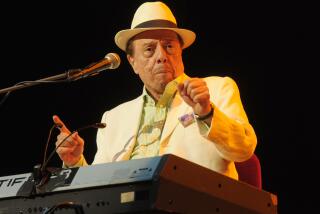Mendes Show Favors the Past
- Share via
SANTA ANA — Nearly three decades after he organized Brasil ‘66, SergioMendes has worked all the way through Brasil ‘77, Brasil ’78 and Brasil ’86 to his current group, Brasil ’99. Despite the passing years, the ensemble he brought to the Rhythm Cafe Saturday night bore remarkably strong resemblance to his gold record-gathering band of the mid-’60s.
There were a few significant differences: a three-man percussion section that reached into timbres and intensities beyond the elegant rhythms of bossa nova; a highly charged sound, rich with synthesizers and roaring with rock decibels; and several new pieces, including a lovely ballad from Milton Nascimento.
For the most part, however, the 51-year-old Mendes--playing his first live date in Southern California in three years--appeared determined to establish a continuing connection with his more successful moments from his past. Much of the set was dominated by such hit numbers as “Mas Que Nada,” “Fool On The Hill” and “The One-Note Samba.”
They were sung with a great deal of verve and enthusiasm by Gracinha Leporace, Kevyn Lettau and Carol Rogers. Lettau, in particular, managed to find fresh meanings in such familiar items as “Manha de Carnaval” (from the film “Black Orpheus”).
What was missing was any substantial reference to Mendes’ new Elektra recording, “Brasileiro,” a work that is noticeably different from all his earlier outings. Overflowing with a colorful collection of Brazilian rhythms touching everything from baiao and forro to ijexa and samba-reggae, it is one of Mendes’ finest efforts.
Why he elected to weigh the evening so heavily in favor of the past, while minimizing his far more fascinating music of the present, is a mystery. Perhaps he has reservations about American audiences’ abilities to respond to the less familiar rhythms of world music. If so, he should rethink his programming approach. His new recording demonstrates effectively that the Brasil ’66 style, once described as “electro-bossa-rock-pop-good-time music,” is ready for a major upgrading.
More to Read
The biggest entertainment stories
Get our big stories about Hollywood, film, television, music, arts, culture and more right in your inbox as soon as they publish.
You may occasionally receive promotional content from the Los Angeles Times.










